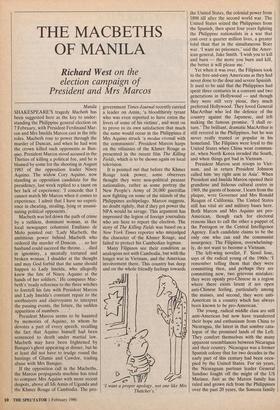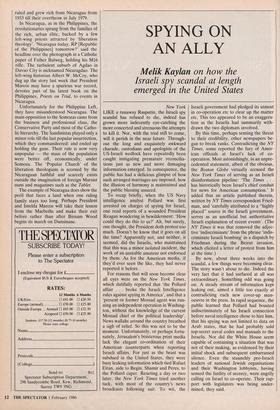THE MACBETHS OF MANILA
Richard West on the
election campaign of President and Mrs Marcos
Manila SHAKESPEARE'S tragedy Macbeth has been suggested here as the key to under- standing the Philippine general election on 7 February, with President Ferdinand Mar- cos and Mrs Imelda Marcos cast in the title roles. Macbeth rose to power through the murder of Duncan, and when he had won the crown killed such opponents as Ban- quo. President Marcos stood accused in the Thirties of killing a political foe, and he is blamed by some for the shooting in August 1983 of the opposition leader Ninoy Aquino. The widow Cory Aquino, now standing as opposition candidate for the presidency, last week replied to a taunt on her lack of experience: 'I concede that I cannot match Mr Marcos when it comes to experience. I admit that I have no experi- ence in cheating, stealing, lying or assassi- nating political opponents.'
Macbeth was led down the path of crime by a ruthless, dominant woman, as the local newspaper columnist Emiliano de Molo pointed out: 'Lady Macbeth, the ambitious power behind Macbeth who ordered the murder of Duncan. . . so her husband could succeed the throne. . . died in ignominy, a mentally tortured and broken woman. I shudder at the thought and may God forbid that the same should happen to Lady Imelda, who allegedly knew the fate of Ninoy Aquino at the hands of her soldiers.' He compares Mac- beth's 'ready reference to the three witches to foretell his fate with President Marcos and Lady Imelda's constant repair to the soothsayers and clairvoyants to interpret the passing events, the future, the sudden apparition of numbers. . .
President Marcos seems to be haunted by memories of Aquino, to whom he devotes a part of every speech, recalling the fact that Aquino himself had been sentenced to death under martial law. Macbeth may have been frightened by Banquo's ghost appearing at dinner, but he at least did not have to trudge round the hustings of Glamis and Cawdor, trading abuse with Mrs Banquo.
If the opposition call in the Macbeths, the Marcos propaganda machine has tried to compare Mrs Aquino with more recent despots, above all Idi Amin of Uganda and the Khmer Rouge of Cambodia. The pro- government Times-Journal recently carried a leader on Amin, 'a bloodthirsty tyrant who was even reported to have eaten the livers of some of his victims', and went on to prove to its own satisfaction that much the same would occur in the Philippines if Mrs Aquino struck 'a modus vivendi with the communists'. President Marcos harps on the villainies of the Khmer Rouge as presented in the recent film The Killing Fields, which is to be shown again on local television.
It is pointed out that before the Khmer Rouge took power, some observers thought they were non-political peasant nationalists, rather as some portray the New People's Army of 20,000 guerrillas now fighting on some of the islands of the Philippines archipelago. Marcos suggests, no doubt rightly, that if they got power the NPA would be savage. This argument has impressed the legion of foreign journalists who are here to report the election. The story of The Killing Fields was based on a New York Times reporter who misjudged the character of the Khmer Rouge, and failed to protect his Cambodian legman.
Many Filipinos see their condition as analogous not with Cambodia, but with the longer war in Vietnam, and the American involvement there. This country has deep and on the whole friendly feelings towards 'I want a proper apology, not one like Mrs Thatcher's.' the United States, the colonial power from 1898 till after the second world war. The United States seized the Philippines from the Spanish, then spent four years fighting the Philippine nationalists in a war that cost over a quarter million lives, a greater total than that in the simultaneous Boer war. 'I want no prisoners,' said the Amer- ican general, Jake Smith. 'I wish you to kill and burn — the more you burn and kill, the better it will please me.'
Yet when it was over, the Filipinos took to the free-and-easy Americans as they had never done to the dour and severe Spanish. It used to be said that the Philippines had spent three centuries in a convent and two generations in Hollywood — and though they were still very pious, they much preferred Hollywood. They loved General MacArthur who led the defence of the country against the Japanese, and left making the famous promise, 'I shall re- turn.' The brilliant, dramatic MacArthur is still revered in the Philippines, but he was never really trusted or popular in his homeland. The Filipinos were loyal to the United States when China went commun- ist, when North Korea invaded the South, and when things got bad in Vietnam.
President Marcos sent troops to Viet- nam, and in return President Johnson called him 'my right arm in Asia'. When President and Imelda Marcos opened their grandiose and hideous cultural centre in 1969, the guests of honour, I learn from the plaque, were Governor and Mrs Ronald Reagan of California. The United States still has vital air and military bases here. Both Marcos and Mrs Aquino are pro- American, though each for electoral reasons likes to call the other a puppet of, the Pentagon or the Central Intelligence Agency. Each candidate claims to be the only one who can end the communist insurgency. The Filipinos, overwhelming- ly, do not want to become a Vietnam.
The left-wing novelist, F. Sionil Jose, says of the radical young of the 1960s: 'I remember telling them that they were committing then, and perhaps they are committing now, two grievous mistakes: they were openly pro-Chinese in a region where there exists latent if not open anti-Chinese feeling, particularly among the masses, and second, they were anti- American in a country which has always been known to be pro-American.'
The young, radical middle class are still anti-American but now have transferred their hope and enthusiasm from China to Nicaragua, the latest in that sombre cata- logue of the promised lands of the Left. They comfort themselves with the many apparent resemblances between Nicaragua and their country. Nicaragua was a former Spanish colony that for two decades in the early part of this century had been occu- pied by the United States. For six years, the Nicaraguan partisan leader General Sandino fought off the might of the US Marines. Just as the Marcos family has ruled and grown rich from the Philippines over the past 20 years, the Somoza family ruled and grew rich from Nicaragua from 1933 till their overthrow in July 1979.
In Nicaragua, as in the Philippines, the revolutionaries sprang from the families of the rich, urban elite, backed by a few left-wing priests attracted by 'liberation theology'. 'Nicaragua today, RP [Republic of the Philippines] tomorrow?' said the headline over the photograph in a Catholic paper of Father Balweg, holding his M16 rifle. The turbulent suburb of Agdao in Davao City is nicknamed Nicaragdao. The left-wing historian Albert W. McCoy, who dug up the story last week that President Marcos may have a spurious war record, devotes part of his latest book on the Philippines, Priests on Trial, to events in Nicaragua.
Unfortunately for the Philippine Left, they have misunderstood Nicaragua. The main opposition to the Somozas came from the business and professional class, the Conservative Party and most of the Catho- lic hierarchy. The Sandinistas played only a minor role till the last popular insurrection, which they commandeered: and ended up holding the guns. Their rule is now very unpopular — the mass of the population were better off, economically, under Somoza. The 'Popular Church' of the liberation theologians is scorned by the Nicaraguan faithful and scarcely exists outside the imagination of foreign Marxist nuns and magazines such as the Tablet.
The example of Nicaragua does show the peril that faces a land when one ruling family stays too long. Perhaps President and Imelda Marcos will take their lesson from the Macbeths and make their exit before rather than after Birnam Wood begins its march on Dunsinane.















































 Previous page
Previous page